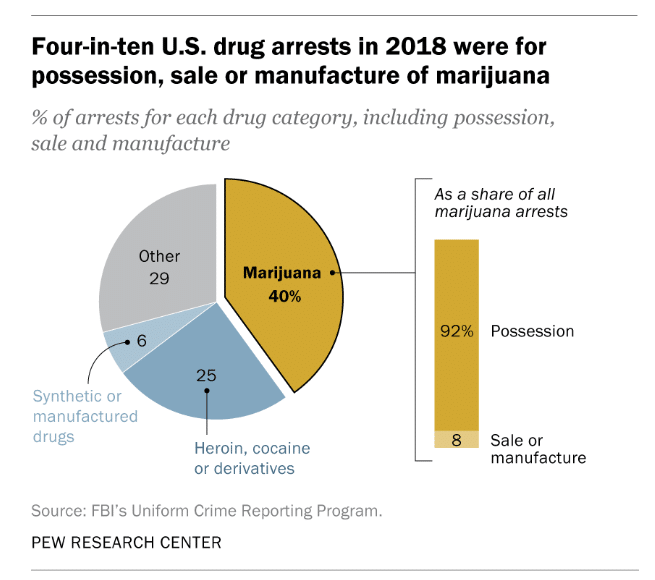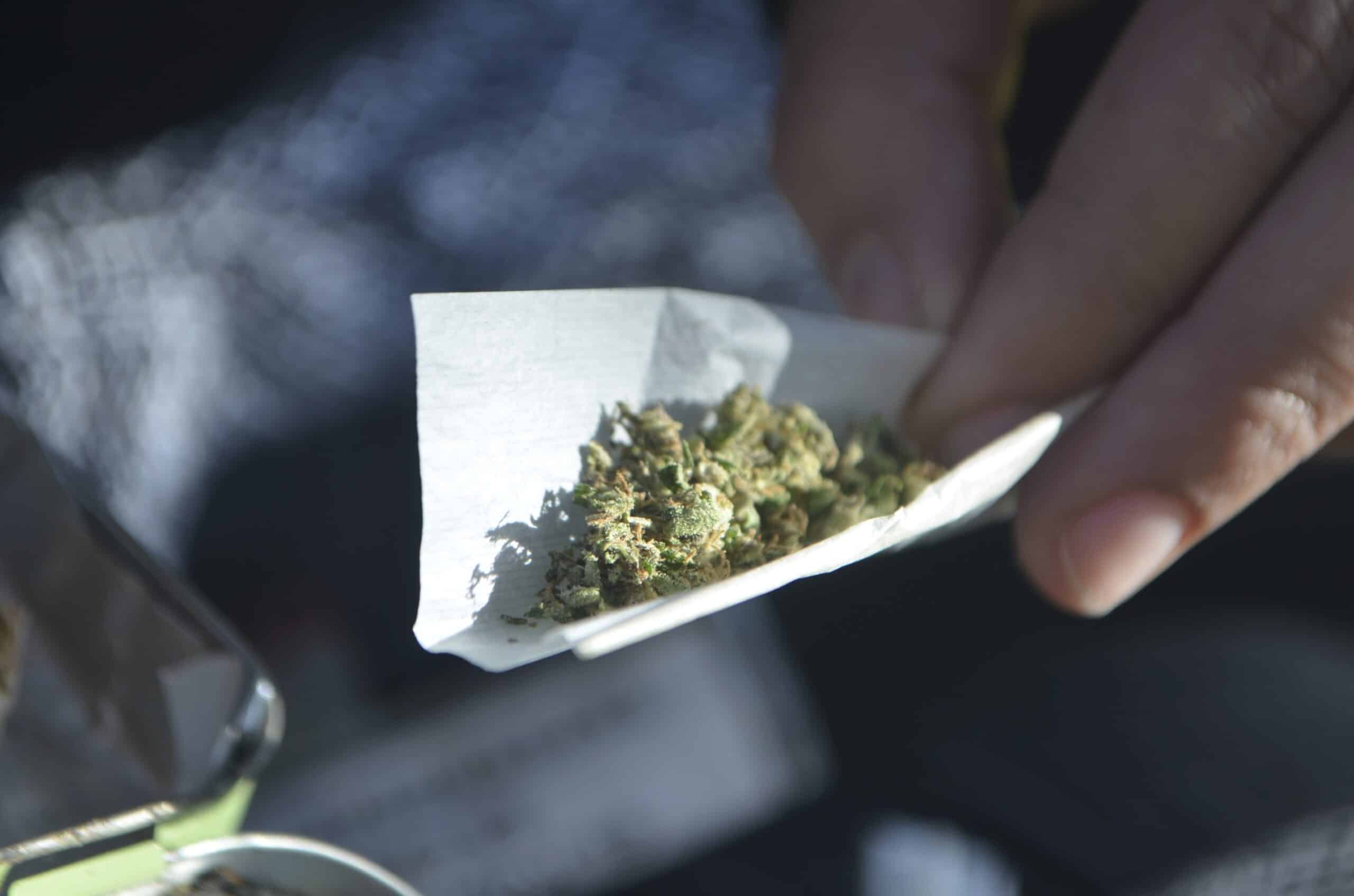The Biden administration is moving to reclassify marijuana as a less dangerous controlled substance to move away from decades of prohibition on the substance and overhaul the country’s federal drug policy.
According to multiple sources, the Drug Enforcement Administration (DEA) will recommend rescheduling marijuana from its current status as a strictly regulated Schedule I drug to the less restrictive Schedule III category.
The reclassification proposal, submitted by Attorney General Merrick Garland to the White House Office of Management and Budget (OMB) on Tuesday, aims to officially acknowledge the medicinal properties of cannabis while still maintaining a certain degree of federal oversight on the substance.
Also read: How to Buy Cannabis Stocks in 2024
This shift comes after President Biden called for a review of federal marijuana laws last year and pardoned thousands of individuals who were convicted of possession under federal statutes (though these cases constituted a tiny fraction of all nonviolent marijuana-related convictions in the US).
Key Takeaways: Marijuana Reclassification by Biden Administration
- Marijuana Rescheduling: The DEA may reclassify marijuana from Schedule I to Schedule III, acknowledging its medical benefits while still regulating it federally.
- Industry Impact: This shift could ease tax burdens, provide access to banking services, and boost the $30 billion legal cannabis industry.
- Public Support: 70% of Americans now support marijuana legalization, with 38 states already having medical programs.
- Research and Legal Benefits: Rescheduling could open more research opportunities and reduce federal marijuana prosecutions.
- Next Steps: The proposal faces public comment and legal review but signals a major step in drug policy reform.
From Social Stigma and Strictly Controlled Status to Medicinal Use
Under the Controlled Substances Act, marijuana has been classified as a Schedule I drug since 1970, placing it in the same legal category as heroin, LSD, and other substances deemed to have a high potential for abuse and no accepted medical use.
Despite the extensive evidence that cannabis has many medical uses from Parkinson’s treatment to pain management, the US government has refused to reschedule the drug for decades.
The proposed rescheduling would move cannabis to Schedule III, which covers drugs like ketamine, anabolic steroids, and certain opioid-based cough medicines considered to have a moderate to low potential for abuse with legitimate medical uses.
“It is significant for these federal agencies, and the DEA and FDA in particular, to acknowledge publicly for the first time what many patients and advocates have known for decades: that cannabis is a safe and effective therapeutic agent for tens of millions of Americans”, Paul Armentano, who serves as deputy director of the National Organization for the Reform of Marijuana Laws (NORML) told USA Today.
Public Opinion Has Evolved Along with State-Level Reforms
The reclassification effort reflects how rapidly public opinion and state-level reforms surrounding marijuana have shifted in recent years. According to a Gallup poll conducted last fall, 70% of American adults now support legalizing cannabis for adult use.
To date, 38 states and the District of Columbia have established comprehensive medical cannabis programs while 24 states have legalized marijuana for adult recreational use. However, this patchwork of state laws has created conflicts with the federal government’s continued criminalization and stringent regulation of the drug.
Rescheduling could be an important step toward resolving these issues by allowing cannabis policies to be guided by science and evidence rather than outdated misconceptions.
Industry Implications: Tax Relief and Access to Traditional Banking Services
For the rapidly growing legal cannabis industry, estimated to be worth nearly $30 billion, the reclassification could provide significant financial relief and open new avenues for expansion and investment.
Under the current tax code, section 280E prohibits legal marijuana businesses from claiming standard deductions for operating expenses, such as rent, utilities, and employee salaries, due to the federal classification of cannabis as a controlled substance. This double taxation has placed a substantial financial burden on the industry.
Rescheduling marijuana to Schedule III would be transformative for the cannabis industry as it would finally allow these legal businesses to operate on a leveled playing field compared to other industries.
The change would eliminate the draconian 280E tax burden but that’s not all. Crucially, it would finally open the doors to traditional banking services, which have remained off-limits due to the substance’s Schedule I status. However, there is a handful of organizations that do not agree with the government’s proposed reclassification.
One example is Kevin Sabet, the CEO of an advocacy group called Smart Approaches to Marijuana.
Sabet believes that rescheduling would be “devastating” to kids in the country as they will be “bombarded” by advertising and indiscriminate promotion of pot-based products.
“Reclassifying marijuana as a Schedule III drug sends the message that marijuana is less addictive and dangerous now than ever before. In reality, today’s highly potent, super-strength marijuana is more addictive and linked with psychosis and other mental illnesses, IQ loss and other problems.”, Sabet told the Wall Street Journal.
While cannabis certainly has side effects and can be abused, there is no doubt that it is in the wrong Schedule. Moving it to Schedule 3, alongside other much more dangerous and addictive drugs like opioids, doesn’t send the message that it’s less addictive or less safe (at least literally). It just indicates that it has legitimate medical uses.
Marijuana Businesses Have Been Operating on a Cash Basis to Date
Currently, most banks and financial institutions are reluctant to serve cannabis businesses due to the industry’s murkiness in regard to the legality of its product and operations. This has forced many companies to operate on a cash-only basis, which only results in massive safety concerns and increased compliance costs.
Safe access to banking services is critical for the cannabis industry to operate efficiently, transparently, and in a way that prioritizes public safety.
Rescheduling would provide the legal clarity that banks need to confidently work with state-licensed operators without fear of federal sanctions or asset seizures.
How are Marijuana Stocks Reacting to the News?
The stock of top cannabis companies and exchange-traded funds (ETFs) tracking the sector experienced significant upticks following the release of these reports.
One industry-specific ETF, the AdvisorShares Pure US Cannabis ETF (MSOS), saw its shares jump by 20% during Tuesday afternoon stock trading while the Amplify Alternative Harvest ETF (MJ) saw its shares increase by 27% during this same period.
The biggest companies in the sector, like Tilray (TLRY), also saw their shares jump by around 37% as investors were buoyed by the prospect of higher profit margins and increased legalization of their operations. Meanwhile, Canadian companies like Canopy Growth (WEED) experienced even sharper upticks with the latter seeing its shares skyrocket by 80% following the news.
It is worth noting that most of these stocks are experiencing sharp drops this morning in early stock trading action with Tilray, Aurora Brands, and Canopy all posting double-digit losses of 17%, 18%, and 21% respectively.
Rescheduling Opens Up Research Opportunities and Medical Advancements
Perhaps one of the most significant impacts of rescheduling would be the removal of longstanding barriers to conducting comprehensive research on the potential medical benefits and risks of cannabis.
As a Schedule I substance, researchers have faced numerous regulatory hurdles and restrictions when seeking to study marijuana, hindering the advancement of scientific understanding of the drug and the development of new cannabis-based medicines. Researchers studying this class of drugs must go through absurdly onerous procedures and compliance measures, making them extraordinarily unpleasant and expensive to work with.
These obstacles may no longer be in place (or would be lessened) if the rescheduling effort goes through. This would open up the door to the creation of enhanced pot-based products that reduce the risks and take full advantage of the benefits of the drug.
Marijuana is Not Any More Addictive or Harmful than Alcohol, Researchers Conclude
According to a leaked report from the Department of Health and Human Services (HHS), marijuana proved to be less addictive than other drugs and its medical benefits were proven by a team of researchers who supported its reclassification many years ago.
Among their discoveries, they noticed that withdrawal symptoms were “relatively mild” compared to substances that are freely distributed with only age restrictions like alcohol. There are also no known deaths from marijuana abuse and overuse.
On the other hand, severe alcohol withdrawal can be deadly.
That said, studies indicate the potential for significant neurological consequences to those who abuse the substance like IQ loss and temporary paranoia.
In addition, some studies have pointed to cardiovascular issues associated with the use of Marijuana. In this regard, Abra Jeffers, a data analyst from the Boston Massachusetts General Hospital commented: “The perceptions of the harmfulness of smoking cannabis are decreasing, and people have not considered cannabis use dangerous to their health.”
She added: “However, previous research suggested that cannabis could be associated with cardiovascular disease.”
Despite these risks, pharmaceutical companies, which have largely avoided involvement with marijuana due to its Schedule I status, may now become more active in the development and distribution of cannabis-based medicines, particularly in states with legal medical programs.
Criminal Justice Impacts and Criticism Over Rescheduling
While the rescheduling would not fully legalize marijuana for recreational use at the federal level, it could potentially lead to a reduction in federal prosecutions for cases of simple possession and mitigate some of the collateral consequences faced by those with prior marijuana convictions.

“Criminal records for marijuana use and possession have imposed needless barriers to employment, housing, and educational opportunities”, President Biden commented during a speech he gave last December.
“Too many lives have been upended because of our failed approach to marijuana. It’s time that we right these wrongs.”
Despite how positive step this current step is, advocates argue that further action, such as removing marijuana entirely from the Controlled Substances Act or federal decriminalization or legalization measures, will still be needed to fully resolve the conflicts between state and federal laws and address the lasting impacts of marijuana prohibition.
Meanwhile, others oppose the measure like Andy Harris, a representative from the state of Maryland who is also a trained physician.
“Removing restrictions on an addictive gateway drug like Marijuana is a dangerous mistake. Numerous studies, including a recent and reputable study published by JAMA, point to the negative impact recreational marijuana has on the body and brain”, Harris posted on his X social media account this week.
Effective Rescheduling is Still Months Away from Happening
While the rescheduling proposal has the backing of the Justice Department and the Department of Health and Human Services (HHS), it still faces potential hurdles before it can be finally approved and enforced.
The proposal will undergo a 60-day public comment period following its publication by the Federal Register.
During this period, stakeholders, advocacy groups, and members of the public can submit feedback and voice their concerns. An administrative law judge will then review the proposed rule, potentially holding additional hearings before issuing a recommendation to the DEA.
Congress could also attempt to overturn the reclassification under the Congressional Review Act, which grants lawmakers the power to block certain rules and regulations proposed by law enforcement agencies. However, such an effort is considered unlikely due to the current political landscape and growing bipartisan support for cannabis reform.
While the proposed reclassification of marijuana represents a significant milestone in the evolution of federal drug policy, it is widely viewed as a critical first step rather than a final destination.
As the reclassification process unfolds, the cannabis industry, research community, criminal justice reform advocates, and policymakers will closely monitor its progress, viewing it as a potential catalyst for further reforms and a pivotal moment in the nation’s ongoing review of its approach to marijuana and how it is viewed and used.

